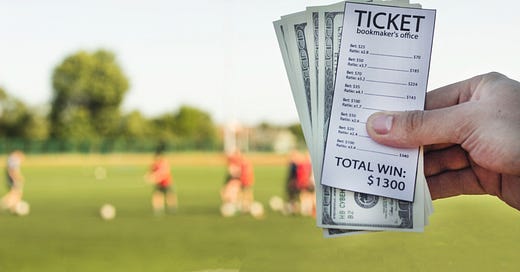Wanna Bet?
A new (and improved) SAFE Bet Act has been introduced in Congress, but will its fate be any different than last year's effort?
The Bulletin Board
THE LEDE: A revamped SAFE Bet Act has been reintroduced in Congress.
ROUNDUP: PA interstate online poker update; Another NY bill bans sweeps; Maryland Senate passes bill prohibiting sweepstakes.
NEWS: Indian Gaming Association webinar tackles prediction markets.
VIEWS: Sweeps operators close the honey pot in favor of vinegar.
AROUND the WATERCOOLER: Best of the best from Next.io Conference
STRAY THOUGHTS: More on helpline calls.
SPONSOR’S MESSAGE - Yes, Sporttrade is indeed a prediction market. Always has been.
The Lede: The SAFE Bet Act Is Back… With a Few Tweaks
Rep. Paul Tonko and Sen. Richard Blumenthal were joined by public health advocates and a family affected by gambling to reintroduce the SAFE Bet Act (HR 2087) on Tuesday.
The press conference happened outside the Capitol, with Tonko reaffirming that the legislation was not a sports betting prohibition. Instead, he is following through with what the Supreme Court suggested in 2018, saying the PASPA ruling, “explicitly gives Congress the green light to regulate sports betting directly. That’s what we’re here to do.”
The new version (the complete text for the bill is not yet available), builds on the legislation unveiled last September, but also has four significant additions:
Prohibits reload bonuses
Restricts VIP and tiered reward programs
Mandates the disclosure of true odds for parlay wagers
Calls for a crackdown on offshore sportsbooks
Harry Levant, the Director of Gambling Policy-Public Health Advocacy Institute and one of the key principles in crafting the SAFE Bet Act is this week’s guest on the Straight to the Point Talking Shop podcast.
According to Levant, the central tenant of the legislation is shifting the onus from the bettor to the operator:
“It's government saying to an industry that has a license to market a known addictive product… we're going to switch the responsibility. We're going to switch the onus.”
“We are shifting the onus away from the individual where the industry has placed it for decades. And we are moving that onus onto the gambling companies and their sports partners.”
The overarching question is what are supporters trying to accomplish? Passage in a hyper-polarized Congress seems unlikely, but as I’ve written, its existence could shape state-level policy in existing and slow efforts in new markets.
Roundup: PA Interstate Online Poker Update; NY Bill Prohibits Sweeps; MD Senate Passes Sweeps Ban Bill
Pennsylvania on track for pre-WSOP launch of interstate online poker: According to Pokerfuse.com: “A Pennsylvania poker player who inquired about the status of the agreement shared a response on PA Discord from the PGCB, stating: “The agreement is with the Governor for signature. We are proceeding with all that is involved behind the scenes for the launching of interstate poker early in the second quarter, and we have no reason to believe the agreement would not be officially in place for that to lawfully occur.” The big question is whether or not sites will be ready to pool players across states once the agreement is signed?
New York Assemblywoman Carrie Woerner files anti-sweeps bill: Carrie Woerner, the new chair of the New York Assembly Racing, Gaming and Wagering Committee, has filed companion legislation to a bill filed by State Sen. Joseph Addabbo Jr., S 5935, that would prohibit sweepstakes gaming sites in the state. Both bills would prohibit sweepstakes sites and target suppliers and affiliates. The legislation also explicitly carves out social sites (where no money is at stake).
Maryland Senate passes sweepstakes prohibition bill: In a 47-0 vote, the Maryland Senate passed SB 860, which seeks to prohibit sweepstakes gaming sites in the state. There is a companion bill in the House.
SPONSOR’S MESSAGE: Vixio, a leading RegTech provider for gambling compliance, has released its 2025 U.S. Sports Betting and iGaming Outlook.
As of January, Vixio predicts the U.S. online sports betting market will be worth $24.8bn to $29bn by 2028.
Download your copy of the U.S. Sports Betting and iGaming Outlook here.
Who is Vixio? Vixio takes the heavy lifting out of regulatory monitoring to help mitigate risk and uncover growth opportunities. Vixio’s award-winning GamblingCompliance platform is trusted by the world’s biggest gambling brands for insights into specific requirements in 180+ jurisdictions to stay current with the ever-evolving gambling regulatory landscape.
News: IGA Sweeps Webinar has Fireworks and Insights
The latest installment of the Indian Gaming Association New Normal Webinar series looked at prediction markets. Before the conversation started, there were fireworks, as host and IGA Conference Chair Victor Rocha booted Marc Brody from the webinar for trolling in the Q&A section. Brody has criticized sweepstakes opponents on social media and carried that over to the webinar, posting:
“How does it feel to be completely tricked into thinking sweepstakes, which you have no recourse against, got all your attention, and here we are in 50 states with all KYC customers in your face. LOL.”
Joining Rocha and co-host Jason Giles, Executive Director of the IGA, was Stephen Hart, Legal Counsel, Womble Bond Dickinson.
Hart laid out the current landscape, noting the cozy relationship the Commodity Futures Trade Commission (CFTC) now has with prediction market companies.
Previously, the CFTC held these companies back, but in 2025, Hart pondered, “What’s going to stop it?”
Giles, noted the new pro-crypto and prediction market CFTC Commissioners appointed by President Trump, Kalshi’s court victory, and the recent news that DraftKings was dipping its toe in the prediction space, wondered aloud if it was “a done deal.”
Hart was less sure the CFTC would be a rubberstamp for prediction markets’ entry into sports betting: “Can the CFTC maintain its integrity? If not, then we [tribes] have a lot to worry about.”
What would cause the CFTC to pump the proverbial brakes? According to Hart, growing opposition, as Major League Baseball has already conveyed its concerns about prediction markets entering the sports betting space, and Hart expects other professional leagues to do the same. Hart also mentioned tribal opposition and the Nevada Gaming Control Board’s cease-and-desist letter.
Rocha likened it to Class II bingo, which morphed into games (through technology) that look and play like Class III machines (slot machines).
The most interesting part of the conversation was Hart’s outlook on the legal timeframe, asking, “will it take four years?” A clear allusion to when Trump will be out of office, and when the next administration might shake up the CFTC.
Rocha said everyone needs to wake up to the fact that this is a state’s rights issue. Giles countered, “It all comes down to the court case, and what is gambling?” But as Rocha said, let’s go to court, “look at their website… they advertised it as gambling.”
Views: The SPGA Prefers Vinegar Over Honey
The Social and Promotional Gaming Association (SPGA) has adopted a notably sharp, confrontational tone in its public statements. The most recent example can be found in its response to New Jersey’s Assembly Bill 5447, which aims to ban sweepstakes gaming sites.
This vinegar over honey strategy prioritizes biting criticism and direct accusations over a softer, persuasive appeal, typically adopted in these situations where harsh criticism is often balanced with appeals to find common ground — see DFS 2.0.
Unlike DFS 2.0’s more balanced approach, sweeps operators have taken a harder line that’s less olive branch and more gauntlet thrown down.
The SPGA emphasizes the legality and legitimacy of sweepstakes gaming with a tone that dares critics to prove otherwise. It also labels prohibitive efforts as “shortsighted and reckless,” implying negligence or malice.
The SPGA’s rhetoric has made the debate black-and-white—legal innovation versus regulatory overreach.
The question is: Will it work?
Highlighting the looming threat might galvanize their base by framing the issue as a fight against unjust overreach. However, throwing down the gauntlet with defiant rhetoric could swell the opposition ranks by turning off neutral or undecided audiences who prefer reasoned discussion over what could be seen as whining or aggression.
Lawmakers and regulators tagged as “reckless” might double-down, and burned bridges could alienate persuadable allies. That invites critics to double down, and could spark deeper investigations into sweeps’ practices. Yes, opponents must justify their stance, but the SPGA will have zero margin for error.
SPONSOR’S MESSAGE - BroThrow.com is growing the most player-friendly, subscription-based sports betting experience in the industry. Our TRUE no-juice/vig/commission platform is the fairest, simplest way to bet on sports.
Sign up and explore: BroThrow
Around the Watercooler
Social media conversations, rumors, and gossip.
Some tweets from the Next.io Conference in New York (assists from Ryan Butler and Geoff Zochodne):
This one leads with a pretty big caveat:
Stray Thoughts
Interesting tack-on from yesterday’s entry about increased problem gambling hotline calls in Wisconsin, from a 2023 Newsweek article:
“Curiously, it's not only states that have legalized sports betting that are seeing related spikes in problem gambling. Newsweek's analysis of state gambling hotlines, for instance, found that calls to the gambling helpline in California, where sports betting isn't allowed, shot up more than 70 percent last year. In Florida, where most sports gambling isn't operational, the Florida Council on Compulsive Gambling reports that outreach to its helpline was up 140 percent in fiscal 2021-2022, compared to fiscal 2018-2019.”
As I said yesterday, it might not be access that is spurring on the calls:
“I would posit that calls and outreach have increased because of legalization, but not because of increased accessibility. Instead, calls are on the rise because gamblers (including those using black market sites) are now seeking treatment due to the following factors:
Increased awareness of their existence, as most states now require 1-800-GAMBLER and other RG/PG notifications in ads, which can run nationally or on the internet. Black market operators don't have to abide by the same regulatory mandates.
Before legalization, gamblers didn’t know who to contact — they certainly weren’t/aren’t going to contact the offshore site. Now, every licensed operator has RG departments that monitor problematic play and offer resources, as do most states.
Widespread legalization and regulation have helped reduce the stigma of seeking help, with state-funded resources.
“A couple of thoughts here:
The rise in calls in Wisconsin should be seen as a good thing. It shows that more existing gamblers are reaching out for help.
The next time someone points to increased helpline calls following the introduction of mobile betting, take it with a grain of salt.











